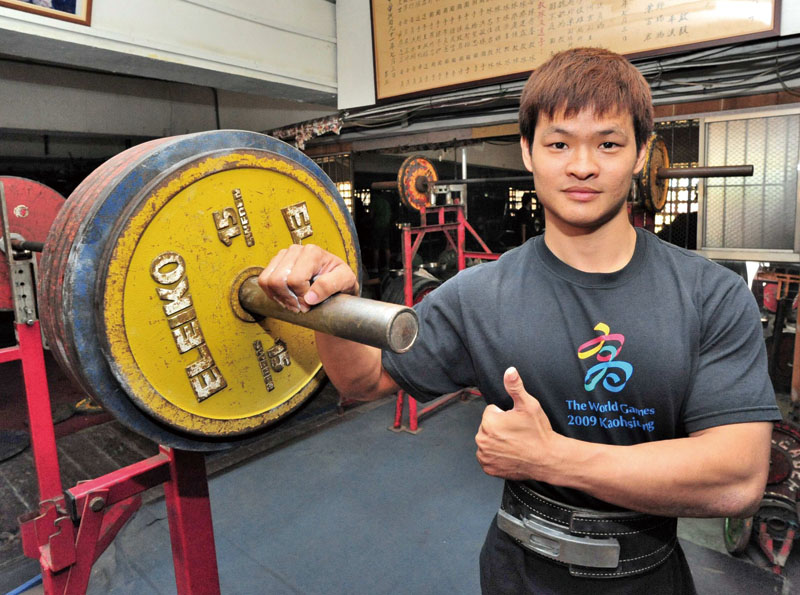An Etude for Championship/世界盃冠軍的練習曲
An Etude for Championship
◎English translation: Peng Hsin-yi
◎Photos by Pao Chung-hui
2009 was a very good year for Hsieh Zong-ting. In 2009, the Kaohsiung native won a gold medal in men's powerlifting at the World Games. When the result was announced, the whole stadium cheered for him. Mr. Hsieh says it was the proudest moment of his athletic career, because he felt the honor of winning for his country.
 Mr. Hsieh is a world-renowned Class Two powerlifter (meaning his bodyweight is between 59 and 66 kg, or 130 to 145 lbs). He entered the realm of powerlifting aged 14, and since then has spent most of his time in the gym. His days are a series of squat lifts, dead lifts, and grip lifts. He then repeats these actions, and all this practice translates into solid performances in the arena, especially in the bench press. An athlete must keep his physical condition at its absolute best, and continue to challenge himself to achieve personal best after personal best, which is what Mr. Hsieh has been doing that for the past 17 years.
Mr. Hsieh is a world-renowned Class Two powerlifter (meaning his bodyweight is between 59 and 66 kg, or 130 to 145 lbs). He entered the realm of powerlifting aged 14, and since then has spent most of his time in the gym. His days are a series of squat lifts, dead lifts, and grip lifts. He then repeats these actions, and all this practice translates into solid performances in the arena, especially in the bench press. An athlete must keep his physical condition at its absolute best, and continue to challenge himself to achieve personal best after personal best, which is what Mr. Hsieh has been doing that for the past 17 years.
After Mr. Hsieh won the World Games title, the fibroids in his leg muscles began acting up and his performances suffered. Following rehabilitation and some adjustment to his technique, Mr. Hsieh attended the 2013 World Games. He won bronze this time, and vowed to work harder to overcome any challenges on the path to gold at the next World Games.
For Mr. Hsieh, competing in an international arena is not only a chance to prove himself, but also a chance to learn from the best in the sport. By observing the movements, postures and techniques of some of the world's finest athletes, he has been able to add to his own routines and enhance his performance. Having a good coach is crucial to an athlete's career, and Mr. Hsieh's coach is Yeh Fu-hong. Under Mr. Yeh's guidance, Mr. Hsieh has been able to follow a practice schedule tailored to his situation, and always give his best when competing. Mr. Yeh is full of praise when talking about his star athlete. He says Mr. Hsieh is a fearless competitor. Currently, Mr. Hsieh's personal best is 290 kg for the squat lift, 210 kg for the bench press, and 290 kg for the dead lift. It is possible to achieve even better results, yet every additional kg is barrier which Mr. Hsieh must work hard to break through. But the coach and athlete trust each other. With the coach at his side, Mr. Hsieh does not have to worry about anything else while he is involved in the sport. He can focus, give everything he has, and channel his explosive energy into powerlifting.
Mr. Yeh says many Taiwanese athletes are capable of winning gold or silver medals at International events, but are held back by a lack of funds. Mr. Hsieh says that winnings from the World Games are a major source of his income, but he only kept half the money. The other half went to the Republic of China Powerlifting Association to use to cultivate new athletes. He is very aware of the underdeveloped status of his beloved sport in this country, and hopes schools can include it as an extracurricular activity so the younger generation can become interested. He also hopes to see more people attend powerlifting events, saying that a cheering audience is the best support an athlete can enjoy.
Powerlifting has taken Mr. Hsieh to over 20 countries, and traveling has broadened his perspectives. As a powerlifter, his body is a construct of solid muscles. With his extra broad shoulders and slim waist, he looks like an inverted triangle. His thighs are as thick as tree trunks, which, he admits, makes it hard for him to shop for jeans. He is very happy having a pair of really big hands, as they give him a firm grip on the bars. When he graduated from high school, he was not sure if powerlifting was the way he should go, but with the encouragement of his coach, he entered the realm of professional sport. Today, Mr. Hsieh is very certain of his choice; he takes practice sessions that may seem repetitive or boring to others stoically, knowing that each lift is going to help him achieve even better results.
世界盃冠軍的練習曲
◎文/侯雅婷
◎照片提供/鮑忠暉
高雄市舉辦「2009年世界運動會」 ,高雄子弟謝宗庭拿下男子健力金牌,那一刻沸騰全場,謝宗庭說,能以運動員身份為國爭光,他感到榮耀。
謝宗庭在男子健力選手第二量級(體重落在59公斤以上和66公斤以下) 叱吒國際體壇,從14歲開始練習健力,青春在反覆練習著蹲舉、硬舉和握舉三種項目中渡過,奠定了雄厚的基本功,臥舉更是他的金字招牌,17個年頭過去,每一刻都在與時間賽跑,保持體能在最顛峰狀態,不斷地自我突破,期能締造出下一次輝煌紀錄。
迄今,謝宗庭締造連續5年世界盃冠軍的佳績,但近3年為腿部纖維化所苦 ,持續復健並調整自己的狀況,今年謝宗庭於世界盃最佳成績是銅牌,激勵著他再進步和突破,超越自己再一次於世界盃摘金,是他奮戰的目標!
謝宗庭比賽時把握機會觀摩全球最頂尖選手的動作、姿勢和技巧,再不斷練習和調整自己的狀況,力求突破。謝宗庭總是按步就班地依著教練排定的班表認真練習,上場時發揮自信與實力。指導教練葉富宏誇讚謝宗庭他上台時毫不怯場,他蹲舉最佳成績是290公斤、臥舉是210公斤、硬舉則是290公斤,再往上突破,每一步都是挑戰。但他與葉富宏教練兩人合作無間,因為葉教練對他的狀況瞭若指掌,只要有教練在一旁,場上的謝宗庭就感到安定,讓他能專注地投入比賽,累積的能量在握緊桿鈴的瞬間發揮潛能,展現最完美的爆發力。
葉教練表示,台灣健力選手具有穿金戴銀的實力,但健力選手們經常面臨經費不足的窘境。謝宗庭直言,世界盃獎金是他重要的經濟來源,一半的獎金則委由中華民國健力協會用於培育新血。辛苦的練習健力如果能有更多的觀眾到場觀賞,對選手是最直接的鼓勵,但由於健力運動在國內尚有待推廣,謝宗庭建議可以從學校開始,把這股運動的熱情傳遞出去。
謝宗庭的人生因為出國參賽至今造訪了20多國,開闊了眼界而更顯豐富,長年鍛練健力則在他身上留下痕跡;全身肌肉發達,有著倒三角形的身形,大腿也較一般人粗壯許多,他透露很難買牛仔褲。他還有雙出奇大的手掌,他說,手掌大才能握緊桿軸,不難讓人感覺他全付的精神都放在健力。他也曾在高中畢業後,對是否持續練習健力感到躊躇不已,但教練鼓勵他,成績開始有了起色,現在放棄健力很可惜,再沒有遲疑 ,現在的謝宗庭將每個看似單調而乏味的練習轉換成能量的累積,繼續為自己寫下紀錄。